[Newspaper]
Publication: The Cincinnati Commercial Gazette
Cincinnati, OH, United States
vol. 46, no. 46, p. 1, col. 1-4
THE KOLAKONKAS.
A SWELL EVENT AT THE ODEON.
THE AMATEURS HAVE AN INNING AT
MINSTRELSY.
A "First Part" Full of Mirth and Magic.
Clog Dancing and Banjo Playing for the
Widows' Home.
The Mikado Done Up by the Curled
Darlings of Fashion.
Pen and Pencil Sketches of the
Performance and the Performers.
The Odeon last night was devoted to Society, to Art, and to Charity, the two first combining in the ministering of the latter. Cincinnati "Society," properly so-called, is notable among that of the great cities of the country for non-support of amusements in ordinary, no matter how meritorious. It is equally famous for the brilliant success of any undertaking upon which it smiles. There would be something provincial in the junction of these two characteristics were it not that the failure to patronize worthy entertainments arises largely from the geographical formation of the city and the difficulty of getting in at night from the residential hills. Be these things they may, whether "society" says "thumbs up" or "thumbs down" or "wiggle waggle," its high behest is mandatory — there is no discretion.
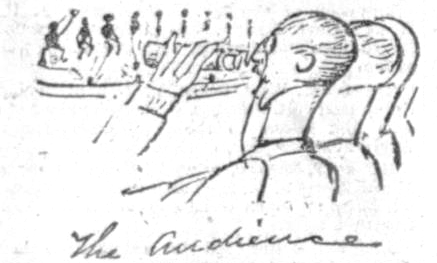 |
The fiat of this all-powerful, if immaterial and indefinable organization, had gone forth that "The Royal Kolakonkas" should have a magnificent and representative audience, and the Widows’ Home receive a substantial benefit. Therefore was the Odeon — exquisite in its neutral tints and frescoing on the natural wood, speaking tenderly to a few of him to whose enthusiasm and wonderful taste pent up in a weak frame the city owes this classic temple — was filled by a late-arriving audience. "A carriage audience." a professional manager would call it — a well dressed one — with dark hues prevailing, and even a suggestion here and there of the bereaved ones in whose behalf the young gentlemen of the city and suburbs were for the evening transformed into makers of mirth and music The $885 boxes were filled by their purchasers and invited guests, and every seat was occupied when the curtain was rung tip on a first part minstrel scene as effective as ever was that familiar as "Forty — Count-'em — Forty" — for Currier's orchestra, blacked up, reinforced the Kolakonkas, and filled up the rear of the stage. Those dress suits and spotless shirt fronts, too. There was no "fake" about them, but they bad done duty in many a drawing room, presided over by the grand dames and dainty demoiselles who sat in front." After the introductory overture by Currier, the "trouble began." The opening chorus "Viva," sung with great precision and spirit, showed how well the Kolakonkas had been drilled, and spoke volumes for the skill and taste of Prof. Chas. J. Coleman, the Musical Director, as did every concerted vocal number on the following programme:
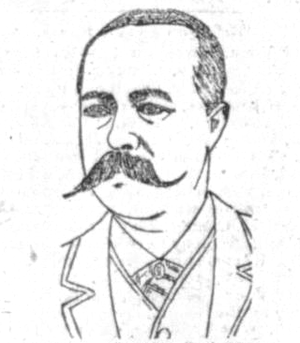 |
| Director Charles J. Coleman. |
PART FIRST.
Interlocutor — Mr. Wm. S. Baxter.
Bones — Mr. Dan C. Hemingray, Mr. John Allen.
Tambos — Mr. Frank Boal, Mr. John Morgan.
Overture....................................................................Orchestra
Opening chorus — "Viva"........................................Kolakonka Vocalists
Comic song — "Great Day".....................................Mr. John Allen
Ballad — "I Love the Sea".......................................Mr. F. S. Smith
Recitation — "Phoebe".............................................Mr. John Morgan
[Written especially for this occasion by Mr. Henry E Dixey, "Adonis."]
Comic song — "McGathigan’s Social Soiree".........Mr. Frank Boal
Quartet — "in Absence" ...........................................Messrs. Boyer. Robinson, Coleman and Smith
Comic ditty — "Yellow Rose of Texas"....................Mr. Dan C. Hemingray
Ballad — "White Wings"..........................................Mr. W. H. Boyer
Part first to conclude with "The Cigarette Guards," words and music written especially for the occasion by Mr. William S. Baxter.
Carnival de Ethiope.
Overture....................................................................Orchestra
Silver Clog Dance.....................................................Mr. William O'Brien
Royal Banjo Septet.
"Boccaccio March."
Mr. E. R. Brvson, Mr. Clifford Perin, Mr. John Gibson, Mr. Matthew Hart, jr., Mr. Peter Gibson, Mr. Chas. Phipps.
Mr. Wm. S. Baxter..................................................Director
Quartet..."More and More".....................................Messrs. Boyer, Robinson, Coleman and Smith
"Uncle Rufe’s Birthday." a song and dance sketch. By Messrs. Edward Miller, Edward Hart, John Morgan, John Allen, Clifford Perin, Matthew Hart, jr., Edward Ernst, Harry Kinney, William O’Brien and John Stevenson.
Introducing the popular some and dance, entitled "Coming Home from Meeting," and Mr. Dan Hemiingray in his unrivaled specialty, "Old Uncle Rufe."
Zither solo (Romanza) — "Pity”...Mr. G. Weaver Loper The entertainment to conclude with the Royal Kolakonka version of the latest operatic success,
"The Mikado."
In one act.
The management submit the following magnificent cast:
Nanki Poo...................................Mr. W. H. Boyer
Pish Tush.....................................Mr. F. S. Smith
Ko Ko..........................................Mr. Dan C. Hemingray
Pooh Bah.....................................Mr. Edward Ernst
Yum Yum, Mr. John Morgan
Pitti Sing, } Three Little Maids { Mr. Clifford Perin
Peep Bo, Mr. Frank Boal
Chorus of Nobles, Guards, Soldiers, Coolies, Rat Eaters, Rice and Opium Fiends.
The comedians — Mr. Dan C. Hemingray and Mr. John Allen, bones, and Mr. Frank Boal and Mr. John Morgan, tambos — now began to get their fine work in. Hemingray claimed to be awful "scared" before all the "Colonels" and "Majors" he saw before him, and said the whole party had been similarly agitated up to a minute before, but why, he asked, were they now like frost-bitten flowers? Of course "Mister Backstair" as he called the interlocutor, "gave it up," and was told it was "because they’d had a nip." Bones Hemingray was then handed a large mail, and the letter which evoked the most laughter among the many mirth-provoking epistles was one reading: "If there is any kissing to be done, throw in a few for me."
"EMMA ABBOTT.”
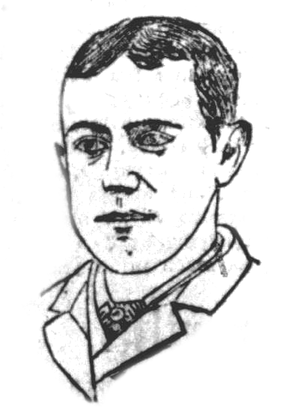 |
| Dan C. Hemingray. |
Mr. Bones Allen came in for a thundering encore for his comic song, "Great Day," and then had to listen to John Morgan's description of Blaine’s house with its "paper washstands." "Paper washstands? impossible," said Mr. Baxter. "Well, they ain’t lead pencils are they? and I know they are stationery," said Tambo, and the audience seemed to think he had the laugh on the middle-man. Mr. B. F. Smith’s grandly sung ballad, "I love the sea, with its double encore only for a moment stopped the — reign — rain of "Chestnuts," as the boys modestly called them, and presently Tambo Allen was in the field with an astounding story about the difference between Aurora beer and a collar, one of which was good on dog, and the other "dog-on good."
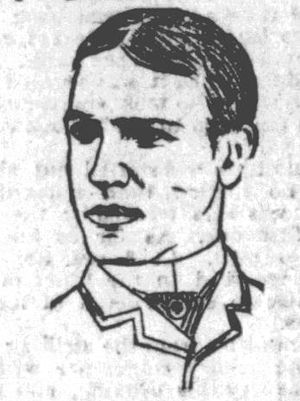 |
| John Morgan. |
The plaintive recitation of Phoebe brought thunders of laughter and applause about popular John Morgan's ears, and Phoebe was recompensed for her lost basket of flowers and fruit by a pretty one of fresh buds. Frank Boal preceded his great triumph in "McGathegan’s Social Soiree, which was encored again and again with a story about Latonia, at which the audience shouted, but the point of which could not be caught in the reporter’s gallery, and then Dan Hemingray "fetched them" with his description of a colored baby he had seen weighing only a pound and a half. "What is funny about that?" said the matter-of-fact interlocutor, and the house roared when Dan replied, "Why that a darky baby should be so light."
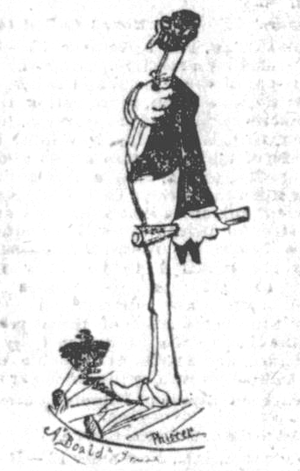 |
| Frank Boal as the Tenor. |
The quartet "In Absence," which promised to be one of the gems of the evening, had to be omitted on account of the sudden illness of Mr. W. H. Boyer, the first tenor, and after Bones Hemingray had amused the house immensely with "The Yellow Rose of Texas," Mr. Robinson, of the quartet, sang the exquisite ballad, "White Wings," for which Mr. Boyer was on the programme, buying kindly volunteered.
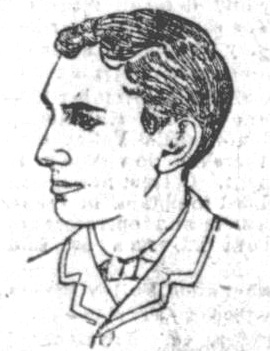 |
| Wm. H. Boyer. |
Though it was not just suitable to Mr. Robinson’s voice he sang it with the essential tenderness of expression and in excellent taste, receiving a cordial encore.
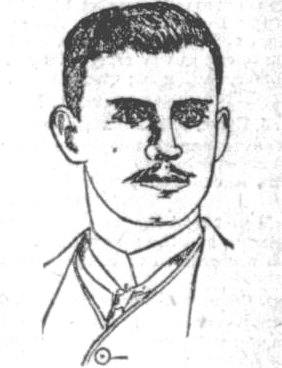 |
| John Allen. |
All this time, of course, the comedians were getting in their work, and Tambo Allen, or Bones Hemingray told how a pug dog owned by "his girl," had got him into difficulty with his employer by wagging his stump tail against the cash register of the toll-gate where he had been employed. And it was John Morgan who told how a "party of them" were accused of being matrimonially inclined because "they had me down from the St. Nicholas to Mill Creek and proposed to Bridget."
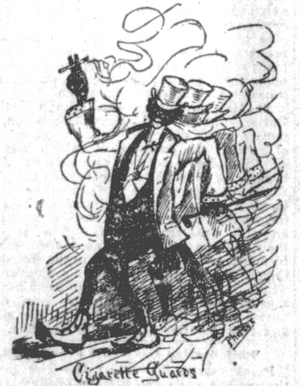 |
The "first part" wound up just at 9 o’clock in "a blaze of glory," with "The Cigarette Guards."
The "make-up" of Messrs. Boal, Hemingray, Morgan and Allen in this sketch was tremendous, and as "awful swells," whose "idol is society," they were simply great. The song is a rattling good one, and was demanded again and again, imperatively.
In dismissing the first part it would be injustice not to notice the thorough work of Mr. W. L. Baxter as Interlocutor — a position on which much of the smoothness of any minstrel performance must largely depend, and which is especially trying on an amateur company.
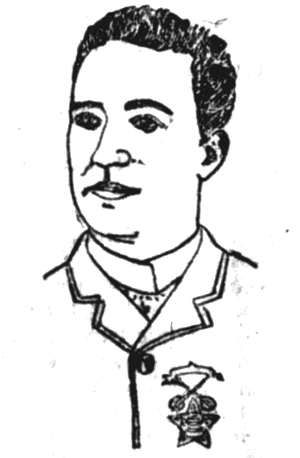 |
| Wm. S. Baxter. |
The opening of the second part, after a well rendered overture by Currier, witnessed one of the most artistic pieces of work ever performed on an amateur stage. Master Wm. L. O’Brien’s "silver clog" awakened the audience very justly to enthusiasm, and the encouragement in turn wrought up the youthful dancer to an elan that he had not, though his work from the first was finished, before shown.
Again and again the audience broke forth in demonstrations of their appreciation of his grace, marvelously good time, and of the spirit of his dancing. Flowers were sent to him, and an elegant gold badge was presented on behalf of friends, as evidence of approval of the hard work which he had done in preparing to take part in the benevolent labors of the evening.
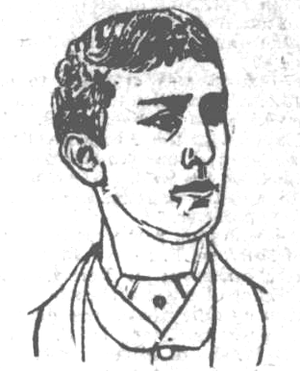 |
| Clifford Perin. |
The Royal Banjo Septet proved a royal one indeed, and there were no lees than four trementions encores, the last two being responded to by duets, which, like the announced number, showed both skill and patient practice. Nothing done here by the Spanish Students ever surpassed the work done by these young amateurs, with the old familiar instrument, the piece de resistance of the old time minstrelsy, when plantation melodies, never rivaled successfully since, were the staple goods of every programme, and when "Old Folks at Home" and "Swanee River" had not given place to ballads, not more sentimental, but less appropriate in the mouths of simulated darkies.
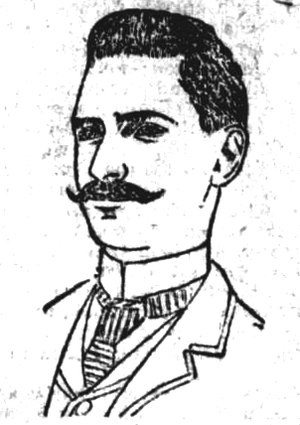 |
| Edward A. Hart. |
The quartet "More and More," on account of Mr. Boyer's is regretted illness, had to be omitted and Uncle Rufe’s Birthday came up next for the criticism, kindly of course, but still the criticism of the audience, and safely could the "song and dance" sketch challenge it.
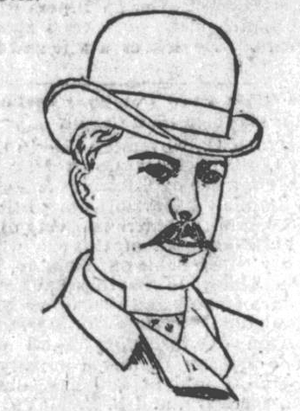 |
| John Stephenson. |
The make-up of the gentlemen engaged in the dance and chorus was admirable — perfect from a character standpoint, and evoking roars of laughter.
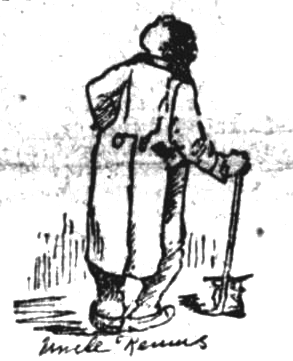 |
Dusky damsels in their abbreviated skirts and aprons and lingerie white as the driven snow from the "home laundry," were veritable pictures from plantation life, while Mr. Dan. C. Hemingray as Uncle Rufe was, in the expressive parlance of the advance agent, "simply immense." His make up and walk were very realistic, and those who are familiar with the old darky character-acting of McAndrews, Newcomb and poor Billy Manning recognized an excellent piece of character work.
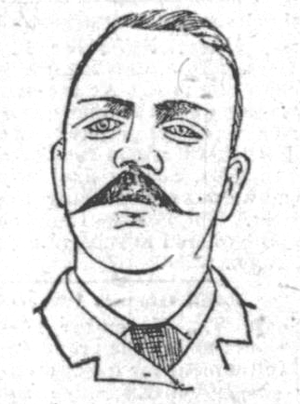 |
| F. S. Smith. |
The old man's song and dance was imperatively re-demanded, and the scene closed in for a treat of tender melody, the zither solo of Mr. G. Weaver Loper. This was deservedly encored, and then the curtain fell, to be soon after raised again upon the familiar scenes and costumes of "The Mikado," Nanki Poo, with its trying tenor solos, in Mr. Boyer’s absence, was taken on a moment's notice by Mr. John Dudley, and he acquitted himself nobly, though compelled to read the spoken portions of the text. Mr. F. S. Smith made a great "Pish Tush," and his song. "You Are Right and We Are Right," was one of the gems of the evening. Mr. Dan Hemingray again came in for a lion's share of the otherwise equally distributed honors for his Koko, "Just Out of the Covington Jail," and his local hits in the "Never will be missed" song, seemed to be keenly relished, notably that at the "Miscalled University Club," where ignorance is bliss. Mr. E. H. Ernst's "Pooh Bah" was magnificently costumed and well sung, adding much to the success of the rendering, and it should be said that the original text and music was strictly followed, except as to "Koko's" charming interpolations.
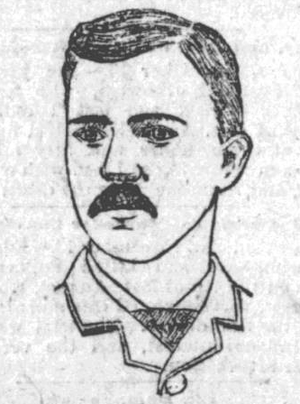 |
| E. H. Ernst. |
"The Three Little Maidens" — Yum-Yum, John Morgan; Pitti-Sing, Clifford Perin, and Peep-Bo, Frank Boal — were veritable triumphs in make up, and it was almost a pity, though it was 11 o’clock, that the final curtain dropped so soon after their entrance. No representatives of the characters ever here were costumed more richly, and their entrance was the signal for great applause as well as amusement. It was, as intimated, to be regretted that the beautiful curtain of the Odeon so soon shut out these lovely maidens, but that, considering all the encores and the one disappointment, the entertainment ended at so seasonable an hour is very creditable to the entire management, and this record of a notable charitable and society event would not be complete without reproducing the entire roster:
General Manager — Mr. Edmond E. Miller.
Musical Director — Mr. Chas. J. Coleman.
Treasurer — Mr. Edward A. Hart.
Business Manager — Mr. William F. Webb.
Stage Manager — Mr. Wm. S. Baxter.
Orchestra under direction of Mr. C. M. Currier.
It was, as said, 11 o’clock when the great and remarkable "show" of the "Royal Kolakonkas" closed, and soon lines of carriages that reached all round Washington Park and the adjoining blocks were speeding on their way to various parts of the three cities and their suburbs — the show the one theme of discussion as it has been for weeks. The Odeon has it way be said in closing, received a fashionable baptism which it deserves and which will benefit the perfectly appointed hall.
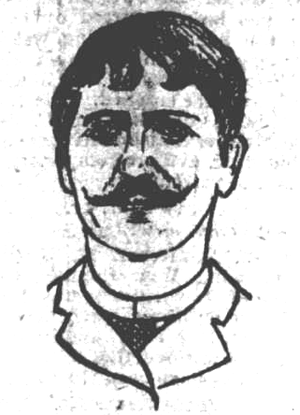 |
| Manager Edmund E. Miller. |
Kolakonka Notes.
— Mr. Irwin Thomas, the "king of pedestal clog-dancers," taught the boys the "doable shuffle" for the song and dance act.
— The diamonds worn by the Kolakonkas were worth a king's ransom. Mr. Frank Herschede, No. 179 Vine street, is the happy owner of them.
— The Kolakonkas desire to express their thanks to Mr. Louis Roth, of the Harm’s Palais Royal, for a half dozen pairs of twenty-two button gloves for the royal ladies.
— The Hurm Decorative Art Rooms were pillaged, at the suggestion of their generous proprietor, and much that was elegant and costly transferred to the Kolakonka stage.
— Mr. Robt. A. Kelly, of the Queen City Floral Bazar, displayed his usual good taste in the decoration of the stage. It was in every sense a bower of beauty.
— Mr. James Collins, the veteran stage manager, rehearsed the company for "The Mikado." He has won for himself many warm friends among the boys, and they will not soon forget his courtesy.
— Mr. J. L. Bowman, No. 217 Race street, with his usual kindness was among the first to place himself and his immense collection of Japanese goods at the disposal of the Hall Committee, and they were not slow to avail themselves of his generosity.
